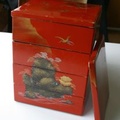>> Part 1
Piano practice in Amache was a challenge and was interrupted by more than wind storms. At one afternoon session I heard tapping on the window. Three friends, Eva, Tami, and Katy peeked in. I smiled. Tic, tic, tic. They continued pecking. I glanced up. Tami began to strike the glass with a rock.
I cried out, “Stop that!” and doggedly finished my scales. Eva began to sing off key. “Mary had a little lamb, little lamb…” Tami and Katy pounded on the wall.
It was useless. My practice was spoiled. When I stepped outside they scurried away like mice.
At dinner the three of them ignored me. I sat alone, humiliated and puzzled. I was sure everyone was staring at me.
Later that evening I wondered aloud why people were so mean sometimes.
My mother consoled me. “Mostly to feel bigger than everyone.”
My three friends—friends?—ignored me for a week, and then suddenly we were buddies again and they suggested a Monopoly game. I told them I had a new Nancy Drew book I wanted to read.
“Have it your way,” Eva said. I found myself on the outs again for a week.
We all seemed bound by Eva’s whims. One week it was Katy’s, then Tami’s turn for rejection. I hated authoritarian figures, but even more than that, I feared being erased, shunned like a leper, so I played along with Eva. The drama played on for a year and into the sixth grade until one day like a bolt from the blue I realized that there were other girls in camp that could be my friends, that there were other acts to follow. When I refused to be intimidated, Eva’s power play fizzled. It was not until I was much older in college that I understood this kind of activity to be part of a twelve and thirteen-year old’s ritual rite of passage. Not many girls escape being pulled into the game, and most of us remember it as an agonizing period of our lives.
My father, meanwhile, found fellow idlers in the rec room. They played poker or mahjong or sat around contemplating the lists of outside jobs in the east posted on the bulletin board: ”Chick sexers needed, room and board plus good wages. Will train.” “Chauffeur for well-to-do family. Will provide transportation from center.” “Work on modern farm. All amenities provided.” “Service personnel for deluxe hotel. Live in comfort in one of our rooms.” The war had depleted the male workforce and in desperation employers were turning to manpower found in the camps.
“You could get a job in the mess hall,” my mother suggested.
“That’s all you think I’m good for?”
“You have experience as a cook.”
“I can make more money outside.”
What kind of life would I have had with a different father? Maybe like Helen’s. Be greeted with hugs and smiles. Well, maybe not hugs because Japanese dads didn’t do that, but, anyway, smiled and brought little surprise trinkets. Perhaps, though, an ideal father was a myth. I heard about them at Sunday School and at grade school. Life magazine had ads for washing machines with a beaming family gathered around sparkling white sheets and towels—was this the happy family with the father providing the means for clean clothes? No, my perfect father would be one who shared a day on a merry-go-round, who took me fishing and camping, who taught me how to change a tire, who laughed at my jokes and praised me when I learned something new like shooting a bow and arrow. He’d do crossword puzzles with me and help me with my spelling. He’d read me stories at bedtime and tell me he loved me.
But, sadly, that kind of love was not something my father ever experienced himself...so he didn’t know how. He’d been abandoned. How could I expect him to know? Now it was too late. Way too late.
Sometime before Thanksgiving that first year in camp my father left us, joining a group of men leaving for Seabrook Farms in New Jersey.
“Mind your mother,” he said. He relinquished this mythical power as he once again moved away from me. With his checkered cardboard suitcase he boarded the back of a panel truck, blending with the men who all wore hats, white shirts, and ties. They looked like apprehensive school boys as they jostled for standing space. He had no idea how long he would be gone, but that he would send money back.
My mother and I stood by the entrance gate and waved until the truck disappeared down the dirt road. I was losing my father all over again.
* * *
Author’s note: This story is another chapter from “18286.” Over the years, especially during Christmas season, I’ve wondered whose hands wrapped those gifts distributed by our Oriental Santa. They probably never knew how much it meant to me/us. The story is my “thank you.”
© 2010 Lily Yuriko Nakai Havey





